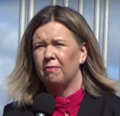| Tasmanian Government | |
|---|---|
 | |
| Overview | |
| Established |
|
| State | |
| Country | |
| Leader | Premier of Tasmania (Jeremy Rockliff) |
| Appointed by | Governor of Tasmania (Barbara Baker) on behalf of the King (Charles III) |
| Main organ |
|
| Ministries | 8 Government Departments |
| Responsible to | Parliament of Tasmania |
| Annual budget | $8.7 billion (2023–2024) [1] |
| Headquarters | Executive Building 15 Murray Street, Hobart |
| Website | tas |
The Tasmanian Government is the executive branch of the Australian state of Tasmania. The leader of the party or coalition with the confidence of the House of Assembly, the lower house of the Parliament of Tasmania, is invited by the governor of Tasmania to form the executive. The governor appoints the premier of Tasmania.
Contents
- Constitutional framework
- Cabinet of Tasmania
- Tasmanian government agencies
- State-owned enterprises
- Other levels of government
- Federal representation of Tasmania
- Local government in Tasmania
- See also
- References
- External links
Since 8 April 2022, the premier of Tasmania has been Jeremy Rockliff, leader of the Liberal Party. The current ministry of Tasmania is the Second Rockliff ministry.








